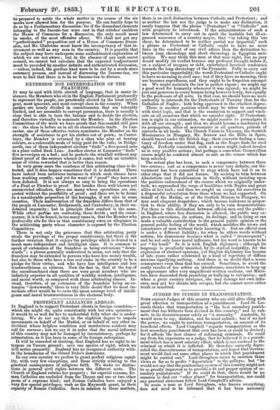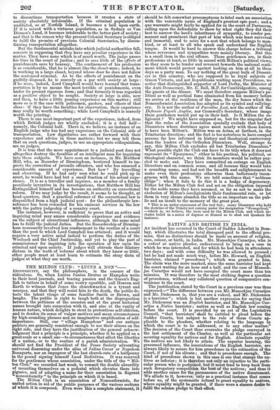JUDGES NO JUDGES IN TRANSPORTATION.
SONE ancient Judges of this country who are still alive cling with great affection to transportation as a punishment. Lord St. Leo- nards thinks that transportation is "the best secondary punish- ment that has hitherto been devised in this country," and he sub- mits to its discontinuance solely as "a necessity." Australia' he would seem to say, dictates, and he must submit ; but if we had the power, we ought to continue transportation, on account of its beneficial effects. Lord Campbell "regards transportation as the best secondary punishment that ever has been or could be devised; for it affords the best chance of reforming criminals. Re could say from his experience as a judge, that he believed it is a punish- ment which has a most salutary effect, which is not confined to the criminal on which it is inflicted. He therefore earnestly depre- cated the discontinuance of transportation, and hoped that Govern- ment would find out some other places in which that punishment might be carried out." Lord Brougham seems to sanction those views so far as to prefer "deportation" to the galleys ; but "he would not say that the penitentiary system of this country might not
i
be so greatly mproved as to provide a fit and proper system of se- condary punishments." If we could do that, there would be no occasion to find out "other places" for transportation, nor could. any practical statesman follow Lord Campbell's advice. So acute a man as Lord Brougham, who knows everything, does not need to be informed that it has been necessary
to discontinue transportation because it creates a state of society absolutely intolerable. If the criminal population is undiluted, as at Norfolk Island, it becomes a 'hell upon earth. If it is mixed with a virtuous population, as in Sydney or Van Diemen's Land, it becomes intolerable to the better part of society; and that is the reason why the present Colonial Secretary is obliged to fulfil the promise of previous Colonial Secretaries, by discon- tinuing transportation altogether. But the fundamental mistake into which judicial authorities fall, consists in supposing that they have any peculiar experience in the matter. They have none which is of much worth. The judge passes his time in the court of justioe ; and he sees little of the effects of punishments save by hearsay. The confinement of his profession is so considerable, that he is almost like the closet-man; indeed, he is working in a large closet, beyond whose door he does not follow the sentenced criminaL As to the effects of punishment on the guiltily-disposed, he is scarcely on a par with society at large : if he were, indeed, Lord Campbell would have learned that trans- portation is by no means the most terrible of punishments, even under its present rigorous form ; and that formerly it was regarded as a positive object to be sought. Society at large is able, now and then, to have a little passing experience on this matter ; still more so is it the case with policemen, gaolers, and others of that class : if they have the faculties for observation, their experience may really be worth something; while Lord Campbell's is scarcely worth the printing. There is one most important part of the experience, indeed, from which British judges are wholly excluded ; it is a full half— namely, the Colonial half. There is, we believe, no instance of an English judge who has had any experience on the Colonial side of transportation. Law dignitaries are rather forward with their experience and advice in these matters; but we may tell them that on such questions, judges, to use an appropriate colloquialism, are no judges. It is true that the mere appointment to a judicial post does not altogether destroy the faculties of an intelligent man for inquiring into these subjects. We have seen an instance, in Mr. Matthew Hill, who, as Recorder of Birmingham, bestirred himself to im- prove the correction of juvenile offenders, and who has amassed a considerable amount of experience. But how P By travelling and observing. If he had only seen what he could pick up in court, he would have had but a small fraction of his actual expe- rience. It is as a traveller and inquirer, as a member of a family peculiarly inventive in its investigations, that Matthew Hill has distinguished himself and has become an authority on correctional reform. If we may judge by the result, it seems to be thought, at head-quarters, that a practical reformer of the correctional law is disqualified from a high judicial post : for the philanthropic law- reformer has been rewarded for his eminent services in the law with the paltry judgeship of a country court.
The instance, however, is sufficient to prove that an active and inquiring mind may amass considerable experience and evidence on the subject of correctional influences, although the same mind has to fnlfil the judicial duties. But the Recordership of Birming- ham necessarily involved less confinement to the routine of a court than the post to which Lord Campbell has attained; and it would require a very active mind indeed to perform the duties of the Woolsack and the Chief justieeship, and yet to play the part of commissioner for inquiring into the operation of law upon the criminal and upon society. If judges will obtrude their dilatory dictum in the teeth of reforms about which they know so little, other people must at least learn to estimate the stray dicta of judges at what they are worth.



























 Previous page
Previous page